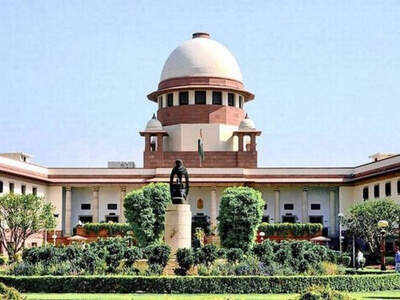Top Searches
- News
- City News
- chennai News
- No day-to-day trial against DGP: Supreme Court
No day-to-day trial against DGP: Supreme Court

Supreme Court
CHENNAI: In a big relief to a suspended DGP-rank officer, facing sexual harassment case trial on a serving woman IPS officer's complaint, the Supreme Court has expunged a Madras high court's order favouring day-to-day trial under its watch.
Making it clear that the trial court in Villupuram could proceed as per law 'purely on its own merits without being influenced in any manner' by a series of orders passed by the high court, a bench of Justice U U Lalit and Justice Ajay Rastogi said the charges (against the DGP) may be framed by the court concerned in accordance with law and not purely as a result of the directions issued by the high court. The bench also permitted the DGP's side to withdraw his plea to shift trial to some other state.
On August 2, the high court had ordered day-to-day trial of the case, and directed the court below to complete the trial in six months without giving any unnecessary adjournments.
Challenging the ruling, the suspended DGP's counsel S Elambharathi an Abdul Saleem filed a special leave petition in the Supreme Court.
Senior counsel Mukul Rohatgi, representing the DGP, argued that there was no occasion and necessity for the high court to take suo motu cognizance and keep monitoring the progress of the matter. It was only because of the high court's orders that the investigating agency showed urgency and filed the chargesheet in shortest possible time. The DGP was placed under suspension because of the high court's orders, he said, adding that the officer's bid to implead himself in the case did not succeed. However, Tamil Nadu government's senior counsel Dushyant Dave, said the high court only monitored the investigation and did not guide it in a particular manner.
The trial court took cognizance of the investigation based on materials placed before it and not because of any directions of the high court, he said. Dave, however, 'readily' accepted that the crucial paragraphs (7&8) of the high court order might need 'appropriate correction'.
(The victim's identity has not been revealed to protect her privacy as per Supreme Court directives on cases related to sexual assault)
Making it clear that the trial court in Villupuram could proceed as per law 'purely on its own merits without being influenced in any manner' by a series of orders passed by the high court, a bench of Justice U U Lalit and Justice Ajay Rastogi said the charges (against the DGP) may be framed by the court concerned in accordance with law and not purely as a result of the directions issued by the high court. The bench also permitted the DGP's side to withdraw his plea to shift trial to some other state.
On August 2, the high court had ordered day-to-day trial of the case, and directed the court below to complete the trial in six months without giving any unnecessary adjournments.
Challenging the ruling, the suspended DGP's counsel S Elambharathi an Abdul Saleem filed a special leave petition in the Supreme Court.
Senior counsel Mukul Rohatgi, representing the DGP, argued that there was no occasion and necessity for the high court to take suo motu cognizance and keep monitoring the progress of the matter. It was only because of the high court's orders that the investigating agency showed urgency and filed the chargesheet in shortest possible time. The DGP was placed under suspension because of the high court's orders, he said, adding that the officer's bid to implead himself in the case did not succeed. However, Tamil Nadu government's senior counsel Dushyant Dave, said the high court only monitored the investigation and did not guide it in a particular manner.
The trial court took cognizance of the investigation based on materials placed before it and not because of any directions of the high court, he said. Dave, however, 'readily' accepted that the crucial paragraphs (7&8) of the high court order might need 'appropriate correction'.
(The victim's identity has not been revealed to protect her privacy as per Supreme Court directives on cases related to sexual assault)
FacebookTwitterLinkedinEMail
Start a Conversation
end of article

